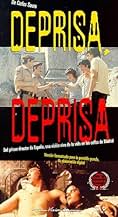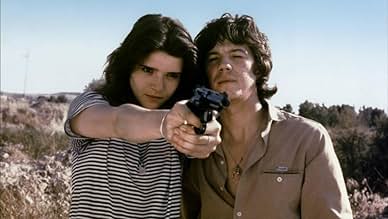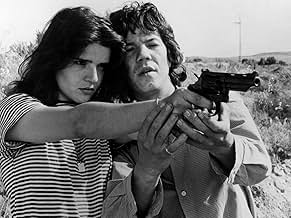VALUTAZIONE IMDb
7,0/10
1951
LA TUA VALUTAZIONE
Aggiungi una trama nella tua linguaAngela begins to hang around with Pablo and his gang of young robbers.Angela begins to hang around with Pablo and his gang of young robbers.Angela begins to hang around with Pablo and his gang of young robbers.
- Regia
- Sceneggiatura
- Star
- Premi
- 1 vittoria e 1 candidatura in totale
Berta Socuéllamos
- Ángela
- (as Berta Socuellamos)
Jose Antonio Valdelomar González
- Pablo
- (as Jose Antonio Valdelomar)
Jesús Arias
- Meca
- (as Jesus Arias)
José María Hervás Roldán
- Sebas
- (as Jose Mª Hervas)
María del Mar Serrano
- María
- (as Maria del Mar Serrano)
André Falcon
- Cajero
- (as Andre Falcon)
Yves Barsacq
- Luis
- (as Ives Barsacq)
Joaquín Escola
- Doctor
- (as Joaquin Escola)
Matías Prats
- Locutor
- (as Matias Prats)
Recensioni in evidenza
Jose Antonio Valdelomar Gonzales asks Berta Socuellamos to be his girlfriend. She agrees. She integrates quickly into his gang of bank robbers. For a while, things go very nicely. They make large scores, leave no important clues, and she is saving money to buy an apartment for them. Then a job goes wrong.
The most notable thing about this movie by Carlos Saura is that the six top roles -- the men in the gang, Srta Socuellamos, and another member's girl friend -- were found in casting calls for non-professional actors. Only one of them appeared on the screen again. Gonzales died 11 years later of a drug overdose in prison, where he was arrested for bank robbery. Rumors abound about the production, most of them scurrilous. I won't take Saura too much to task for this sort of casting; from Academician "theory of types" to Robert Bresson, to Eastwood in THE 15:17 TO PARIS, directors have undertaken to cast non-professional in key roles, sometimes under elaborate theories, sometimes because you admire what they did, and sometimes because, well, why hire some one to play Audie Murphy, when he's on the payroll as an actor?
Saura does get good performances out of them, by directing them to maintain low affects and keeping their lines simple. He crafts believable situations, tense bank robberies, and so forth. So it's a very well made movie. If anything, it demonstrates another Academician theory, the Kuelshov Effect, which is that acting is largely irrelevant to acting; the audience infers the thoughts of the actors by how the shots are edited together.
The most notable thing about this movie by Carlos Saura is that the six top roles -- the men in the gang, Srta Socuellamos, and another member's girl friend -- were found in casting calls for non-professional actors. Only one of them appeared on the screen again. Gonzales died 11 years later of a drug overdose in prison, where he was arrested for bank robbery. Rumors abound about the production, most of them scurrilous. I won't take Saura too much to task for this sort of casting; from Academician "theory of types" to Robert Bresson, to Eastwood in THE 15:17 TO PARIS, directors have undertaken to cast non-professional in key roles, sometimes under elaborate theories, sometimes because you admire what they did, and sometimes because, well, why hire some one to play Audie Murphy, when he's on the payroll as an actor?
Saura does get good performances out of them, by directing them to maintain low affects and keeping their lines simple. He crafts believable situations, tense bank robberies, and so forth. So it's a very well made movie. If anything, it demonstrates another Academician theory, the Kuelshov Effect, which is that acting is largely irrelevant to acting; the audience infers the thoughts of the actors by how the shots are edited together.
A good look at the delinquency in Spain of the 80's, good photography, great soundtrack.
Pablo, Angela, El Meca and Sebas, four marginalized teenagers from Madrid are forced to live a life of crime in order to survive and escape the poverty they live in. The movie is quite entertaining, the crime scenes are very realistic, the soundtrack fits just perfect and the message is clear and powerful.
Crime is created by poverty and poverty is created by luxury, something we are all responsible of.
A great political statement, then and now.
Pablo, Angela, El Meca and Sebas, four marginalized teenagers from Madrid are forced to live a life of crime in order to survive and escape the poverty they live in. The movie is quite entertaining, the crime scenes are very realistic, the soundtrack fits just perfect and the message is clear and powerful.
Crime is created by poverty and poverty is created by luxury, something we are all responsible of.
A great political statement, then and now.
A group of friends embark on a short and doomed life of crime in Madrid in the 1970's. Filmed in color in and around Madrid, with some great locations and a nice flamenco/rock soundtrack, the characters choose to live dangerously rather than work in deadend jobs. The film seems to be saying something about society and opportunity, but doesn't get lost in any sermons. It sticks with the characters up to the inevitable end, and goes into some out of the way locations, with one scene having them on horseback and crossing a busy highway. Saura has made a real portrait out of each of the characters while showing a dusty and not too pleasant side of Madrid somewhere out in its suburbs.
Intelligent and thrilling film based on facts about juvenile delinquency in Spain since the 80s . Well directed by Carlos Saura who tried to create a sort of Spanish Neo-Realism by tackling the juvenile delinquency in the Madrid's poor quarters from a sociological point of view. In his second stage dealing with delinquents , the first was ¨Los Golfos¨, he tried to take a position in observation of outcast people, and he got to make a documentary-style cinema. It deals with a group of inseparable friends delinquents named Pablo (Valdelomar) , Meca , El Sebas forced into street hustling and ever-expanding life of crime . The three of them carry out car-thief and scheme bank-robbery to earn money in and around Madrid slums . So, they'll have to gather some money and in order to do anything that's necessary to escape the poverty and also as part of the street life they have drugs . The young street-criminals in Madrid embark on a series of armed robberies to raise the money that they use to rise their existence . Meanwhile, Pablo falls in love for a bar girl named Angela (Socuellamos) and gather together with their friends . The protagonists choose to live dangerously and they are forced to live a life of crime to survive and flee the suburbs of Madrid.
¨Deprisa , Deprisa¨ is one of several movies dealing with youth delinquency in Spain during the 70s and early 80s along with ¨Perros Callejeros I and II¨, ¨Navajeros , "Colegas" ,"El Pico", "El Pico 2" and later ¨La Estanquera De Vallecas ¨ , among others . These films were notorious in the years of the Spanish transition to democracy including provoking and polemic issues and played by unknown young people . His style is pretty much urban and realistic as well in the atmosphere as in the fresh dialog and attempted to take a position in favor of outcast people . Drugs , delinquency, and generational problems are the habitual subjects in these films and specially dedicated to the underworld of heroin . Passing of time hasn't had mercy with most of those movies , but they represented a time and a way of life in the history of Spain ; and now they may seem a little bit naive . In ¨ Deprisa , Deprisa¨ or ¨Fast , faster¨ we watch the day-by-day of a group of delinquents committing violent crimes , however Saura got to make a both lyric and documentary-style flick . A great look at young life and friendship in the margined side let the story flow efficiently and being realized in realistic style . We see their troubles growing in such a low-class "barrio" called Vallecas from Madrid outskirts and some fine locations . The director creates a sort of Spanish Neo-Realism by tackling the juvenile delinquency in the Madrid's poor quarters from a sociological point of view . Carlos Saura shows the ugliness of those "barrios" , toughness and cold existence . The screenplay is such strong with disagreeable events , including a love story and violent scenes , though also with some ingenuousness , but in 1980, a few years after General Franco died it wasn't naive at all. Saura chose young and natural actors as Valdelomar and Socuellamos who play their part to the hilt , unafraid of filmmaker's unsympathetic camera and the particularity of the characters. Passable photography with juicy atmosphere by Teo Escamilla , deemed one of the best Spanish cameraman , but unfortunately turns too much murky in some video print , being necessary a a correct remastering . Musical score includes a lot of flamenco songs by that time with the successful Los Chichos.
The motion picture is well directed by Carlos Saura , a good Spanish movies director. He began working in cinema in 1959 when he filmed ¨Los Golfos ¨(1962) also dealing with juvenile delinquency . Saura is a well recognized filmmaker both nationally and internationally, and in proof of it he won many prizes among which there are the following ones: Silver Bear in the Berlin Festival for ¨ La Caza or The Chase¨ (1966) his most successful film , and for Peppermint Frappé (1967), in 1967. Special Jury Awards in Cannes for La Prima Angélica (1974), in 1973, and for Cría Cuervos (1976), in 1975. Also, the film Mamá Cumple Cien Años (1979) got an Oscar nomination in 1979 as the best foreign film, and it also won the Special Jury Award at the San Sebastian Festival. In 1990, he won two Goya , The Spanish Oscar , as best adapted screenplay writer and best director. Saura became an expert on Iberian musical adaptations as ¨Carmen , Amor Brujo , Bodas De Sangre , Sevillanas ,Iberia , Salome, Fado, Flamenco ¨ and even recently Opera as ¨Io , Don Giovanni¨
¨Deprisa , Deprisa¨ is one of several movies dealing with youth delinquency in Spain during the 70s and early 80s along with ¨Perros Callejeros I and II¨, ¨Navajeros , "Colegas" ,"El Pico", "El Pico 2" and later ¨La Estanquera De Vallecas ¨ , among others . These films were notorious in the years of the Spanish transition to democracy including provoking and polemic issues and played by unknown young people . His style is pretty much urban and realistic as well in the atmosphere as in the fresh dialog and attempted to take a position in favor of outcast people . Drugs , delinquency, and generational problems are the habitual subjects in these films and specially dedicated to the underworld of heroin . Passing of time hasn't had mercy with most of those movies , but they represented a time and a way of life in the history of Spain ; and now they may seem a little bit naive . In ¨ Deprisa , Deprisa¨ or ¨Fast , faster¨ we watch the day-by-day of a group of delinquents committing violent crimes , however Saura got to make a both lyric and documentary-style flick . A great look at young life and friendship in the margined side let the story flow efficiently and being realized in realistic style . We see their troubles growing in such a low-class "barrio" called Vallecas from Madrid outskirts and some fine locations . The director creates a sort of Spanish Neo-Realism by tackling the juvenile delinquency in the Madrid's poor quarters from a sociological point of view . Carlos Saura shows the ugliness of those "barrios" , toughness and cold existence . The screenplay is such strong with disagreeable events , including a love story and violent scenes , though also with some ingenuousness , but in 1980, a few years after General Franco died it wasn't naive at all. Saura chose young and natural actors as Valdelomar and Socuellamos who play their part to the hilt , unafraid of filmmaker's unsympathetic camera and the particularity of the characters. Passable photography with juicy atmosphere by Teo Escamilla , deemed one of the best Spanish cameraman , but unfortunately turns too much murky in some video print , being necessary a a correct remastering . Musical score includes a lot of flamenco songs by that time with the successful Los Chichos.
The motion picture is well directed by Carlos Saura , a good Spanish movies director. He began working in cinema in 1959 when he filmed ¨Los Golfos ¨(1962) also dealing with juvenile delinquency . Saura is a well recognized filmmaker both nationally and internationally, and in proof of it he won many prizes among which there are the following ones: Silver Bear in the Berlin Festival for ¨ La Caza or The Chase¨ (1966) his most successful film , and for Peppermint Frappé (1967), in 1967. Special Jury Awards in Cannes for La Prima Angélica (1974), in 1973, and for Cría Cuervos (1976), in 1975. Also, the film Mamá Cumple Cien Años (1979) got an Oscar nomination in 1979 as the best foreign film, and it also won the Special Jury Award at the San Sebastian Festival. In 1990, he won two Goya , The Spanish Oscar , as best adapted screenplay writer and best director. Saura became an expert on Iberian musical adaptations as ¨Carmen , Amor Brujo , Bodas De Sangre , Sevillanas ,Iberia , Salome, Fado, Flamenco ¨ and even recently Opera as ¨Io , Don Giovanni¨
This movie makes beautiful use of Flamenco music, and does it better than any I've seen. Carlos Saura obviously cares deeply about the medium, as he also made a movie called Flamenco (although it's just a concert piece).
The story is very basic; it deals with the adventures of young street-criminals in Madrid who graduate from car-theft to bank-robbery. What's interesting is the way Saura makes us care about these "hijos de nadie", who are kind and decent people 50% of the time, and feel they have no future in regular society. But the movie never sentimentalizes them - they do exactly what you'd expect such people to do.
Dialogue is kept to a minimum; a lot of the communication is via the graceful gestures the Spanish are so good at. This allows extra time for the soundtrack, and it really gets you into the spirit of the film, which is really more like dance than acting.
Flamenco originated among the dispossessed, among beggars and gypsies condemned to live in waste places and junkyards on the edge of town, and the scenes of the barren housing-projects on the fringes of Madrid really bring this feeling to life.
Deprisa, Deprisa conveys a better understanding of the spirit of Flamenco than more elegant movies dedicated to the subject. (And Carlos Saura is a genius).
The story is very basic; it deals with the adventures of young street-criminals in Madrid who graduate from car-theft to bank-robbery. What's interesting is the way Saura makes us care about these "hijos de nadie", who are kind and decent people 50% of the time, and feel they have no future in regular society. But the movie never sentimentalizes them - they do exactly what you'd expect such people to do.
Dialogue is kept to a minimum; a lot of the communication is via the graceful gestures the Spanish are so good at. This allows extra time for the soundtrack, and it really gets you into the spirit of the film, which is really more like dance than acting.
Flamenco originated among the dispossessed, among beggars and gypsies condemned to live in waste places and junkyards on the edge of town, and the scenes of the barren housing-projects on the fringes of Madrid really bring this feeling to life.
Deprisa, Deprisa conveys a better understanding of the spirit of Flamenco than more elegant movies dedicated to the subject. (And Carlos Saura is a genius).
Lo sapevi?
- QuizJose Antonio Valdelomar González (Pablo) was recruited by Carlos Saura in a casting for non-professional actors. He was paid US$3,000. In 1992 he was found dead of a heroin overdose at Carabanchel prison (Madrid), where he was arrested for robbing a bank.
- ConnessioniFeatured in Caso cerrado (1985)
I più visti
Accedi per valutare e creare un elenco di titoli salvati per ottenere consigli personalizzati
- How long is Deprisa, Deprisa?Powered by Alexa
Dettagli
- Data di uscita
- Paesi di origine
- Sito ufficiale
- Lingua
- Celebre anche come
- Deprisa, Deprisa
- Luoghi delle riprese
- Aziende produttrici
- Vedi altri crediti dell’azienda su IMDbPro
Botteghino
- Budget
- 36.000.000 ESP (previsto)
- Lordo in tutto il mondo
- 632 USD
Contribuisci a questa pagina
Suggerisci una modifica o aggiungi i contenuti mancanti

Divario superiore
By what name was In fretta, in fretta (1981) officially released in Canada in English?
Rispondi
![Guarda Trailer [OV]](https://m.media-amazon.com/images/M/MV5BNmFmMTIwM2QtZTQ3Ny00MTBkLWIzOWYtZjUzMDkzYTQzOTdlXkEyXkFqcGdeQXRyYW5zY29kZS13b3JrZmxvdw@@._V1_QL75_UX500_CR0)

















